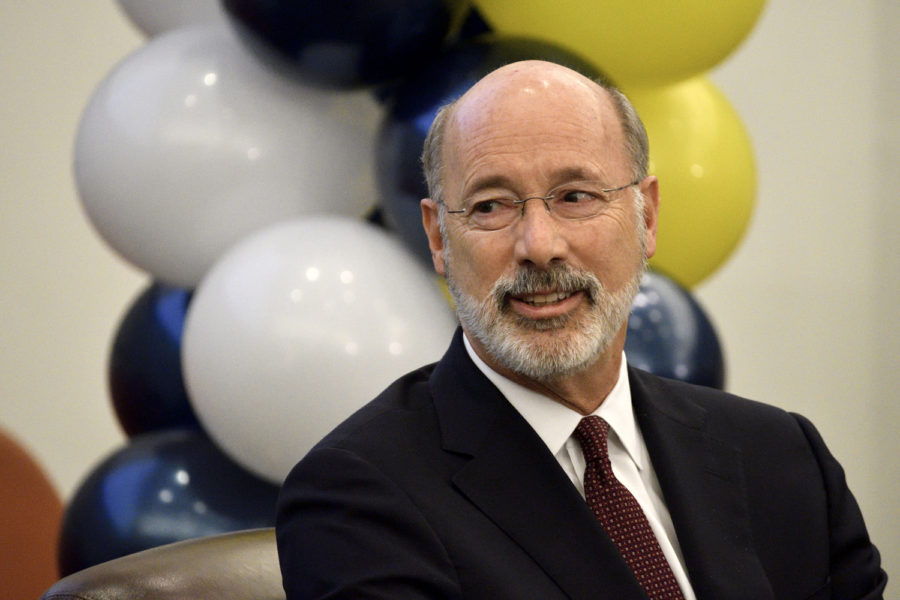Gov. Wolf proposes flat funding for Pitt in proposed budget
Bastiaan Slabbers/NurPhoto/Zuma Press/TNS
Gov. Tom Wolf recently signed legislation mandating that all universities in the state must create anonymous online reporting systems for complaints about sexual harassment and violence.
February 4, 2020
Pitt could receive the same amount of money as it did during fiscal year 2020, despite asking for a 5.5% increase in state funding for fiscal year 2021.
Pa. Gov. Tom Wolf’s $36.1 billion budget, released Tuesday, includes flat funding for the commonwealth’s four state-related universities. The University received a 2% increase, or around $3.5 million, in funding last year after initially requesting a 6.5% increase, or $9.1 million.
Pitt spokesperson Kevin Zwick said the University appreciates its state support and looks forward to further discussions about the budget in the coming months.
“Gov. Wolf’s proposed spending plan is just one of many steps in determining the state’s budget,” Zwick said. “We look forward to engaging with the General Assembly as well as the Governor’s Office as this process evolves.”
Even with the requested 5.5% increase in state funding, students could still see a tuition hike next year.
The University’s budget request includes tuition spikes next year of 3% for in-state students and 5% for out-of-state students, as well as fee increases of 8 to 10% for graduate students. These increases would together raise an additional $31.1 million, according to budget documents submitted last October to state officials.
Zwick said the tuition increases in the budget documents are “placeholders” based on this year’s tuition hikes.
When asked to clarify whether the placeholders meant that tuition would eventually go up by a currently unspecified amount, Zwick said it is too early in the budget process to know what the University administration would recommend to the Board of Trustees.
The 14 schools comprising the state-owned Pennsylvania State System of Higher Education, which does not include Pitt, stand to gain from Wolf’s proposed budget through the new $204 million Nellie Bly Tuition Program. The program will provide need-based assistance to PASSHE students if they agree to stay in-state for the same number of years for which they receive tuition assistance. The program is paid for through the Pennsylvania Race Horse Development Trust Fund, which collects slot machine taxes to benefit the state horse-racing industry.
Next year’s possible tuition hike at Pitt would follow raises of 2.75% for most in-state students and 5% for most out-of-state students enacted for the current academic year. In both the Swanson School of Engineering and the School of Computing and Information, in-state students faced a 4.75% increase, while out-of-state students faced a 7% increase.
Pitt Chief Financial Officer Hari Sastry said in August that a larger tuition increase was necessary for SSOE and SCI this academic year due to a higher cost of providing education in those schools.
Chancellor Patrick Gallagher spoke about Pitt’s changing funding sources at the September 2019 Board of Trustees meeting.
He cited that in 1995, the commonwealth covered 56% of in-state tuition, but now only pays for 34%, which has led the University to launch a slate of new financial aid programs in the past year, including the Pitt Success Pell Match, where Pitt will match federal Pell grants.
“We have really not had the historical pattern of providing high levels of financial aid by the institution to support those affected,” Gallagher said. “Simply put, we are caught in a transition of being a highly supported state school, which can offer low tuition for everyone, and a more weakly subsidized one where the institution has to provide more financial aid.”
Gallagher is expected to testify in Harrisburg, the state capital, in the coming months at appropriations hearings, with a final vote on funding this summer, per the annual budget process. Pitt will also host its annual Pitt Day in Harrisburg lobbying event on March 17.



